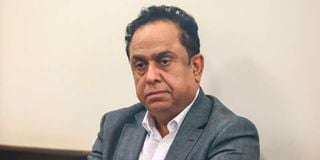
Businessman Yagnesh Devani and his lawyer Hillary Kiplagat at the Milimani Law Courts Nairobi on February 12, 2024.
In the high-stakes world of Yagnesh Devani — the Triton oil baron and master of narrow escapes—luck moves like a shadow, constant and unwavering.
Recently, when Devani was set free from the Sh7.6 billion Triton scandal, it unveiled yet another sordid tale of the country’s persistent incapacity to prosecute alleged sleaze.
The courtroom heard, rather meekly, that the prosecution, led by DPP Renson Ingonga, lacked witnesses and vital documents needed to seal his fate. The DPP opted for a gentler approach and ultimately chose to withdraw the case.
The Devani trial, which commenced on August 7 with 11 counts before Chief Magistrate Thomas Nzioki at Nairobi’s Milimani Law Courts, promised to be a treasure trove of revelations about the inner machinations at the Kenya Pipeline Company, a citadel of oil cartels.
It was set to expose the not-so-innocent art of siphoning oil and selling it to the market —and getting away with it. The proceedings were poised to spotlight the Open Tender System, a setup as susceptible to exploitation by oil cartels as a buffet to a hungry crowd.
Did the witnesses chicken out? It is not known.
When the Triton scandal broke in 2008, as Kenya went through the healing motions of the post-election violence, Devani — an oil magnate with impeccable political connections — made a swift exit.
Meanwhile, banks and financiers — KCB, PTA Bank, Fortis Bank of the Netherlands, Glencore Energy UK Limited, and Singapore’s Emirates National Oil Corporation (ENOC)—were left grasping at paperwork and staring into empty coffers.

Tycoon Yagnesh Devani. He is the architect of the Sh7.6 billion Triton oil scandal.
Devani and his company had roots in Kisumu, where this ambitious oil venture first took shape. With a nudge from Nyanza politicos, with connections in the oil industry, Triton managed to secure a six-month national oil supply quota — a considerable feat for a relatively small firm. Triton outmaneuvered seasoned veterans like Shell and BP, despite its glaring lack of capacity. So, it had to subcontract – and pocket the balance for paperwork. Then came the masterstroke: Triton withdrew all the oil worth Sh7.6 billion without so much as a heads-up to its financiers.
Mr Simon Gatiba Karanja, then head of the Directorate of Criminal Investigations, had promised the nation that he would bring Devani to justice. Mr Karanja pursued the fugitive with tireless zeal, determined to ensnare the elusive oil baron.
The chase came to a sudden dead-end when Mr Karanja collapsed at his Thika home, succumbing to "breathing complications." His untimely demise cast a pall over the hunt, stalling the pursuit of the masterminds behind the Triton scandal.
The crux of the case against Mr Devani was that he “dishonestly arranged — or conspired with others to arrange — the transfer of oil to Total,” fully aware that this slick maneuver would leave his financiers high and dry, stripped of their security over the product.
Although the cargo wasn’t to be released without financier approval, some well-placed officials at the Ministry of Energy and Kenya Pipeline decided to turn a blind eye, green lighting the release like it was just another routine shipment. It was that simple.

Businessman Yagnesh Devani at the Milimani Law Courts Nairobi on February 12, 2024.
Critics said that despite Triton's modest presence in the oil industry, with barely one per cent of the market share, it wielded political clout within the Grand Coalition government that belied its size.
It was these connections that transformed a minor player into a force with the power to shake giants.
Within KPC, its managers allowed the company to hold speculative stock in the storage facilities to the detriment of other users.
There were complaints from other industry players that, at one point, Triton occupied half of the space available at the KPC facilities at times. It would buy crude oil when prices were low and wait to offload when the prices climbed.
When Mr Devani founded Triton Petroleum Limited in 2000, his ambitions were fuelled by the allure of Kenya’s Open Tender System (OTS) — a gateway for small, homegrown oil enterprises to procure competitively priced crude for refining at Mombasa’s now defunct facility.

Businessman Yagnesh Devani in court.
The OTS, a brainchild of the Ministry of Energy, encouraged oil marketers to vie for the privilege of importing refined and raw petroleum for the entire sector. In many instances, these imports were secured by financiers through a Collateral Financing Agreement (CFA), and the agreement was that the financiers had a say on the oil cargo.
How Mr Devani allegedly orchestrated the sale of a Sh7.6 billion cargo — 72,284 metric tonnes of crude oil — and offloaded more than he had imported, and all without his financiers’ permission, was what confounded investigators.
While the truth may never be known, now that Mr Devani has been let go, those who sanctioned the release of the oil from the Kenya Pipeline Company did not face justice either. More so, the court was told, they were unwilling to testify.
The Triton oil scandal, as it became infamously known, was thus woven by insiders from the Ministry of Energy, then under the stewardship of Mr Kiraitu Murungi, and the Kenya Pipeline Company, led by George Okungu.

Businessman Yagnesh Devani at Milimani Anti-Corruption Court on August 6, 2024.
The extent of senior officials’ knowledge about Triton’s schemes to offload fuel without the knowledge of financiers will forever remain a mystery now that the Devani case has been closed after 16 years.
While some high-ranking officials placed the blame on elusive junior officers, never tracked nor prosecuted, others claimed ignorance — Energy Permanent Secretary Patrick Nyoike alleged he was kept in the dark, while Mr Murungi denounced the affair as “a serious crime of dishonesty and fraud” — as if the scandal had simply tiptoed past his office without so much as a knock.
The Ministry of Energy, clearly in no rush to chase down the masterminds, left Triton’s financiers high and dry, running after a fugitive and the hollow shell of a company.
When the dust finally settled, Triton had piled up a staggering Sh7.6 billion in IOUs — Sh1.85 billion to KCB, Sh2.3 billion to Glencore, Sh906 million to Fortis of France, and a neat Sh2.5 billion to Emirates National Oil Company.
But here was the kicker: Triton’s assets barely covered the ink on those loans, and its “big boss” had vanished, leaving creditors holding little more than a stack of paperwork and a whole lot of regret.
To truly grasp the Triton saga, one must peek into the dealings of its financier, Glencore Energy.
When Glencore sought compensation from Kenya Pipeline, the case revealed that this financier was hardly an innocent bystander. The Court of Appeal exposed Glencore’s eagerness to wedge its way into Kenya’s oil sector via Triton’s licence, conveniently ignoring Triton’s glaring lack of funds to even purchase crude.
Predictably, their venture went up in flames, and Glencore turned to the courts, hoping for a helping hand. The Court of Appeal, however, was in no mood to play along, invoking the ex dolo malo no ovitur actio principle—a lofty Latin way of saying, “If you’ve been playing dirty, don’t expect us to come to your rescue.” In a move that left Glencore empty-handed, the court nixed a Sh4 billion High Court award with a pointed message: “No court ought to enforce an illegal contract if the applicant is up to their neck in wrongdoing.”
In the grand theatre of oil trading, Triton was but a small fish, while Glencore loomed large as a multi-billion-dollar empire, its roots tracing back to the late Marc Rich—an international commodities trader with a flair for the dramatic and a knack for controversy.
Rich, infamous for his tax evasion escapades, once found himself indicted in the US on federal charges amounting to a staggering $48 million in tax evasion—the largest tax fraud case in US history.
To add to his colourful resume, his company was accused of striking dubious oil deals with Iran during the hostage crisis. Much like Mr Devani, Mr Rich didn’t stick around for the curtain call; he promptly fled to Switzerland, leaving behind a legacy as slippery as the oil he traded. Mr Devani took off the same style – before he was caught and extradited from London on January 23, 2024.
The saga of Triton and Glencore reads like the tale of two companies set on skirting Kenya’s laws and pull off some highly creative oil trading. Whether they schemed together, or one hoodwinked the other, the truth behind this oily affair was to finally spill in court.
Now, it won’t. But the Court of Appeal had already unearthed Glencore's cunning strategy, describing it as a “front, cover, and cloak” through which Triton was used to penetrate Kenya’s oil market without a licence—a move the judges dubbed “a flagrant illegality.” Yet the lingering enigma remains: just how many within the Ministry of Energy and Kenya Pipeline were privy to this grand scheme?
Those entrusted with unraveling the tangled web of the Triton scandal appeared conspicuously mute, reduced to mere acknowledgments of their own deception. Among them were Energy Minister Kiraitu Murungi, Kenya Pipeline Company’s managing director George Okungu, and Energy Permanent Secretary Patrick Nyoike. Kenyans held onto the hope that at last, a platform had emerged for their narratives to unfold.
There have been some fall guys. Perhaps. Mr. Okungu, weeks after his dismissal in connection with the scandal, found himself charged — not for the controversial release of processed petroleum to Mr Devani but for the questionable sale of Kenya Pipeline houses valued at over Sh60 million.
Thus, the saga of Triton has now faded into obscurity. High Court Judge George Odunga quashed the case against Okungu, asserting that he had fallen victim to “selective” justice and “discrimination.”
With Mr Devani now out of the way, another scandal has ended as mysterious as it started.
On X: @johnkamau1









